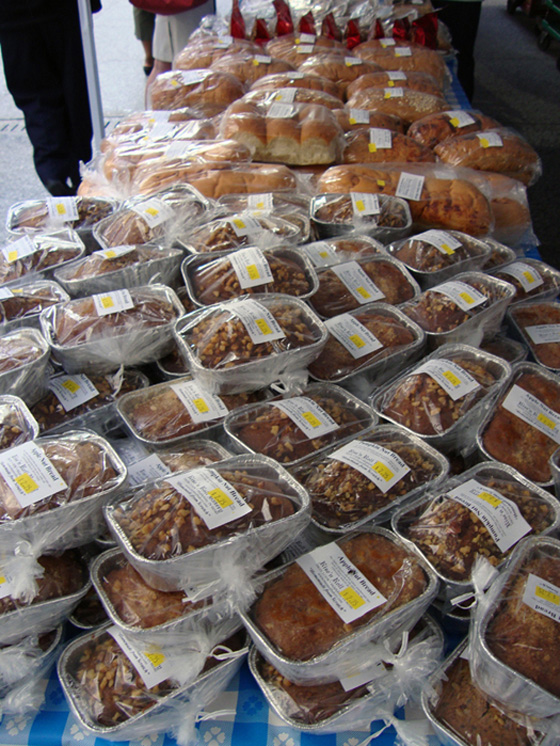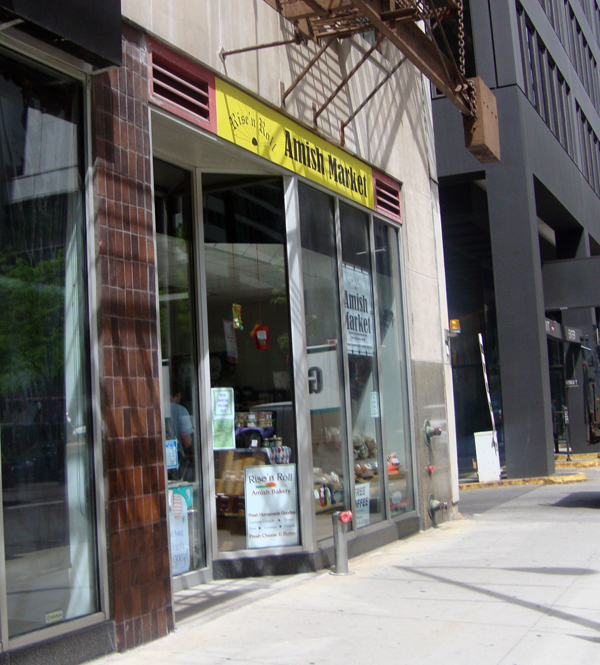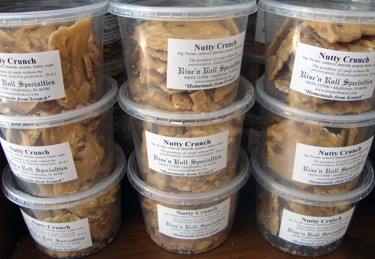| « 40,000 Boxes in 40 Days | Pub Crawls this Thursday » |
Feature Fri Aug 13 2010
Amish Bakery Takes Root in the Loop
 This article was submitted by freelance writer Hallie Busta.
This article was submitted by freelance writer Hallie Busta.
Tom Hart is undoubtedly a salesman and he has his pitches down. Spend enough time watching him interact with customers and you too will know them by heart.
The customer comes in. He offers a sample and a few lines of PR for his product.
"They're easy on the teeth, but highly addictive," he'll say. "The ladies in Chicago have nicknamed this 'Amish crack.'"
Nut crunches, peanut butter granola bars, cinnamon caramel doughnuts and cheeses of all sorts arranged in a sparsely decorated, wood-shelved storefront. His one-liners would be much less convincing if the samples he relentlessly doles out weren't so, well, addictive.
Hart is the general manager of the Rise 'n Roll Bakery & Deli and its wholesale division, Rise 'n Roll Specialties, which first opened in Middlebury, Ind., in 2001. Since then, the business has expanded, changed ownership and opened two locations in Chicago.
With Hart running the front of the operation, the more technical matters are left to 33-year-old Orvin Bontrager, the bakery's founder. "He's the number cruncher. He's the backbone of the business, even the owners admit that, that he's the driving force," says Hart.
Bontrager, who is Amish, started the business out of his Middlebury, Ind. home in 2001. For eight years he, his wife and a small staff produced their baked goods without air conditioning or electricity. The nearest telephone was a half a mile down the road and they received their faxes through the local copy store.
"I'm Amish. I like being Amish and always will be Amish," he said over the phone. "I'm not the type of guy that likes to push things."
 But by early 2009, the operation had surpassed the limits of his Amish faith. In order to keep growing, Bontrager sold the business to a non-Amish couple from Middlebury. That summer they opened a new facility incorporating the modern conveniences the growing business required.
But by early 2009, the operation had surpassed the limits of his Amish faith. In order to keep growing, Bontrager sold the business to a non-Amish couple from Middlebury. That summer they opened a new facility incorporating the modern conveniences the growing business required.
Since then, Bontrager and Hart have controlled its day-to-day operations. Today, that includes a storefront location in Chicago and a number of farmers markets within the city.
From the name to the products to the Amish employees, the business is distinctively Amish. This identity can be a benefit to a business, says Donald Kraybill, a senior fellow at the Young Center for Anabaptist and Pietist Studies at Elizabethtown University in Elizabethtown, Pa.
"One of the unique things an Amish person receives when they start a business and that an 'English' person receives when they take over an Amish business is free use and access to an Amish brand," he says.
Of the bakery's 60 employees, six are not Amish. The rest are either Amish or Old Order Mennonite and live in northern Indiana. About 50 work in the bakery and the rest work part time at the farmers markets and the Chicago store, commuting to and from each day.
"If you're back at the bakery behind the counter, if you don't have a bonnet or a beard you're out of place," says Hart.
This is not unusual for a business rooted in the nation's third-largest Amish community. Middlebury is located in northern Indiana's Elkhart County. This area and nearby LaGrange County together are home to 136 Amish church districts, according to the Young Center, which studies Amish communities in the United States.
Church districts are localized, faith-based communities that average about 135 members each. Although they share common Amish principles, they vary in strictness. As of 2008, there were 1,710 such districts spread across 27 U.S. states and the Canadian province of Ontario. Indiana ranks third in the number of church districts on the list of 27 states the Young Center notes as having Amish settlements. Ohio tops the list and Pennsylvania ranks second.
But according to Larry Andrews, the Executive Director of Community and Economic Development at the Nappanee Chamber of Commerce in northern Indiana, Rise 'n Roll's growth is unusual for an area hit especially hard by the recession, with unemployment topping 18 percent last September.
Over the past few decades, many Amish have left their farming lifestyles, seeking employment in industries like craftsmanship and recreational vehicle production. But when these industries took a hit last year, many of the Amish workers were forced to return home, some to smaller, family-run specialty shops, says Andrews. "They've always had a little shop at home and it was kind of a hobby," he says. "It's their main source of income now."
And although there are more than 200 of these shops in the area, he says that less than half target tourists. Of the 9,000 such businesses nation-wide, Kraybill cites a 10 percent failure rate (complete closure) among them.
But to reach the level of establishment that Rise 'n Roll has achieved, Andrews says that these small businesses usually end up selling themselves to someone outside the Amish faith in order to allow the operation to keep growing and to satisfy specific federal regulations and requirements. In the case of Rise 'n Roll, the non-Amish owners have adopted a hands-off approach allowing Bontrager and Hart to remain in charge.
 Selling Amish Amish Empire
Selling Amish Amish Empire
Hart met Bontrager in 2006, when he was hired as his driver. Because the Amish generally don't own or operate automobiles, Hart drove Bontrager and the Rise 'n Roll products into Chicago for the farmers markets, where they had been selling since 2004. Eventually, Hart began helping Bontrager sell at the markets and was soon running the bakery's operations in Chicago.
That's when Bontrager brought up the idea of establishing a permanent location in the city. "He had the vision and knew that in order to make it worthwhile to come, the cost of a driver, rental, so on, that he would have to go to a market where he could turn some volume," Hart said.
When the new ownership took over in 2009, they honored Bontrager and Hart's plan to rent space in Chicago, allowing the pair to open a storefront at 42 S. Clark Street and in the 233 N. Michigan Ave. building, the latter of which closed last month.
But permanently expanding into this urban market comes with challenges. And selling under the Amish name brings its own set of risks. "I've always stressed not using that or doing that because I don't believe in using our way of life to make a living or our business," says Bontrager.
Hart agrees. But because the majority of the employees are Amish or Old Order Mennonite, he's less worried about exploiting their lifestyle. Instead, it's a question of what's Amish-made and what isn't and making sure customers can distinguish between the two.
Standing in the shell of the former 233 N. Michigan Ave. store, where they now operate as a small vendor stand on Fridays, Hart explains that the products are not 100 percent Amish in the way many customers imagine them to be.
He uses their canned and jarred goods as an example. "In reality, [with] the FDA on canning regulations, [it] is just crazy to think that you're going to stay at home in your kitchen -- you think of the Amish or your grandma from back in 1950 at home in her kitchen canning and then bringing it out to retail, that doesn't work," he says.
Instead, Rise 'n Roll reflects a unique mixture of Amish methods and modern technology. "They are bringing their values, they are bringing their ethic and they are just stepping in and doing it the way they've always done," he says. "It's the craftsmanship, it's not necessarily the tools they are using because they are using modern tools that everybody else uses, it's just the craftsmanship and skill they are putting into it."
This feature is supported in part by a Community News Matters grant from The Chicago Community Trust and the John S. and James L. Knight Foundation. More information here.









Tony Spataro / August 16, 2010 1:13 PM
Hi Hallie,
We are what we eat. (Pray,Love)
Great article,keep up the good work!
All The Best,
Tony Spataro
TAG DAIRY DIST.
Toronto Ontario
Canada